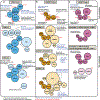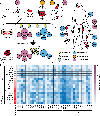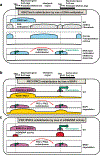Context-specific Polycomb mechanisms in development
- PMID: 35681061
- PMCID: PMC9933872
- DOI: 10.1038/s41576-022-00499-0
Context-specific Polycomb mechanisms in development
Abstract
Polycomb group (PcG) proteins are crucial chromatin regulators that maintain repression of lineage-inappropriate genes and are therefore required for stable cell fate. Recent advances show that PcG proteins form distinct multi-protein complexes in various cellular environments, such as in early development, adult tissue maintenance and cancer. This surprising compositional diversity provides the basis for mechanistic diversity. Understanding this complexity deepens and refines the principles of PcG complex recruitment, target-gene repression and inheritance of memory. We review how the core molecular mechanism of Polycomb complexes operates in diverse developmental settings and propose that context-dependent changes in composition and mechanism are essential for proper epigenetic regulation in development.
© 2022. Springer Nature Limited.
Conflict of interest statement
Competing interests
The authors declare no competing interests.
Figures





References
-
- Lewis PH Pc: Polycomb. Drosoph Inf Serv 21, 69 (1947).
-
- Slifer EH A mutant stock of Drosophila with extra sex-combs. Journal of Experimental Zoology 90, 31–40, doi:10.1002/jez.1400900103 (1942). - DOI
Publication types
MeSH terms
Substances
Grants and funding
LinkOut - more resources
Full Text Sources
Molecular Biology Databases

